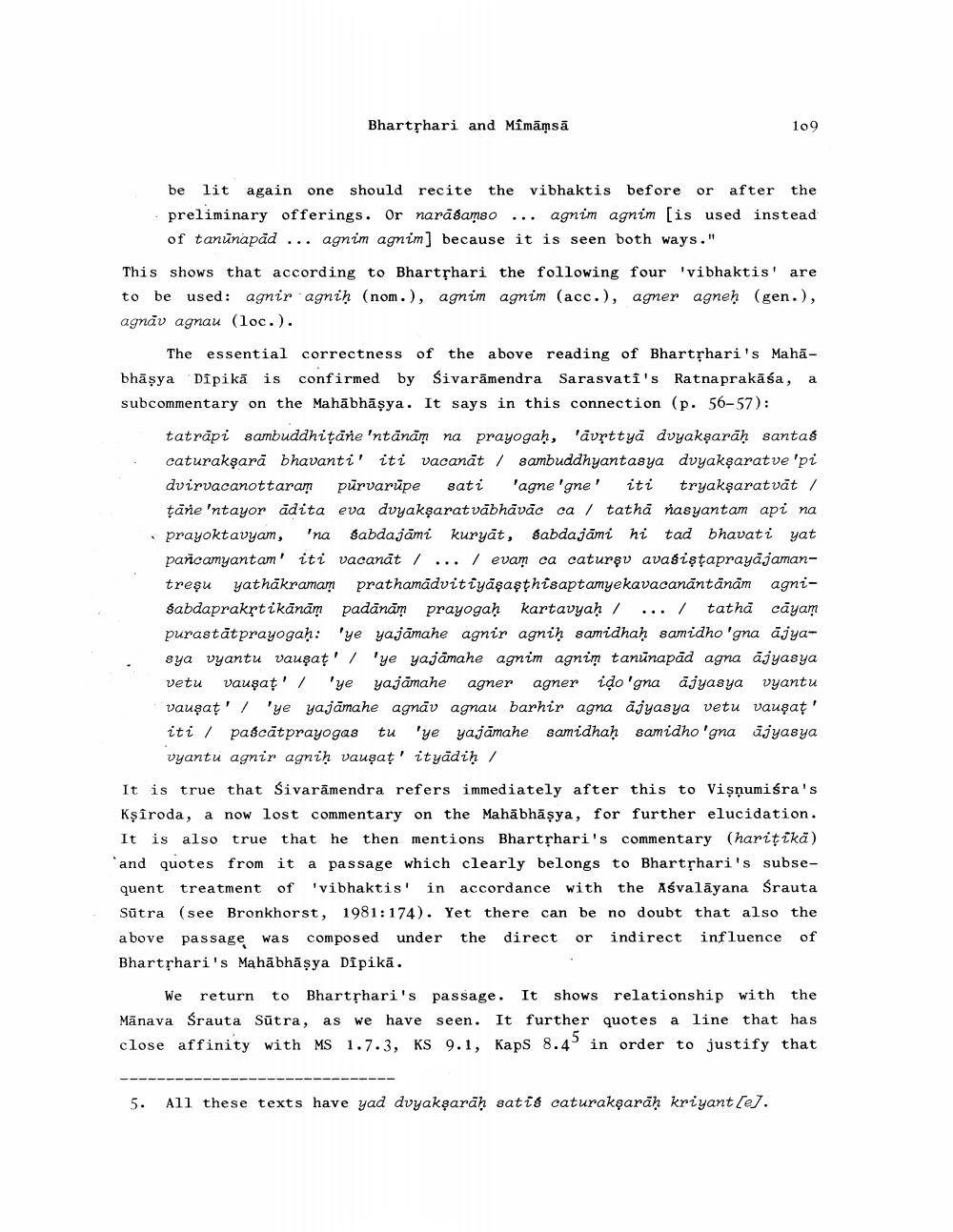Book Title: Studies On Bhartrhari Author(s): Johannes Bronkhorst Publisher: Johannes Bronkhorst View full book textPage 9
________________ Bhartshari and Mîmāmsā 109 be lit again one should recite the vibhaktis before or after the preliminary offerings. Or narasamso ... agnim agnim [is used instead of tanūnapad ... agnim agnim] because it is seen both ways." This shows that according to Bhartshari the following four 'vibhaktis' are to be used: agnir agnih (nom.), agnim agnim (acc.), agner agneh (gen.), agnāv agnau (loc.). The essential correctness of the above reading of Bhartshari's Mahabhāsya Dipikā is confirmed by Śivarāmendra Sarasvati's Ratnaprakāśa, a subcommentary on the Mahābhāşya. It says in this connection (p. 56-57): tatrāpi sambuddhiţane 'ntānām na prayogaḥ, 'avrttyä dvyakşarāḥ santas caturakşarā bhavanti' iti vacanāt / sambuddhyantasya dvyakşaratve 'pi dvirvacanottaram pūrvarūpe sati 'agne 'gne' iti tryakşaratvāt / tāne 'ntayor adita eva dvyakşarat vābhāvāc ca / tathā nasyantam api na prayoktavyam, 'na sabdajāmi kuryāt, sabdajāmi hi tad bhavati yat pancamyant am' iti vacanāt / ... / evam ca caturşv avasiştaprayājamantreşu yathākramam prathamadvitiyāşaşthisaptamyekavacanāntānām agnisabdaprakrtikānām padānām prayogaḥ kartavyaḥ / ... / tathā cāyam purastātprayogaḥ: 'ye yajāmahe agnir agnih samidhaḥ samidho 'gna ajyasya vyantu vauşat' / 'ye yajāmahe agnim agnim tanūnapad agna ajyasya vetu vauşaț' / 'ye yajāmahe agner agner ido 'gna ajyasya vyantu vauşat' / 'ye yajāmahe agnav agnau barhir agna ajyasya vetu vauşat' iti / pascātprayogas tu 'ye yajāmahe samidhaḥ samidho 'gna ajyasya vyantu agnir agnih vaușaț' ityādih / It is true that Sivarāmendra refers immediately after this to Vişnumisra's Kșíroda, a now lost commentary on the Mahābhāşya, for further elucidation. It is also true that he then mentions Bhartshari's commentary (hariţikā) and quotes from it a passage which clearly belongs to Bhartshari's subsequent treatment of 'vibhaktis' in accordance with the Aśvalāyana Srauta Sūtra (see Bronkhorst, 1981: 174). Yet there can be no doubt that also the above passage was composed under the direct or indirect influence of Bhartshari's Mahābhāşya Dipikā. We return to Bhartshari's passage. It shows relationship with the Mānava Srauta Sūtra, as we have seen. It further quotes a line that has close affinity with MS 1.7.3, KS 9.1, Kaps 8.4" in order to justify that ------------------ 5. All these texts have yad dvyakşarah satis caturakşarāḥ kriyant [e].Page Navigation
1 ... 7 8 9 10 11 12 13 14 15 16 17
